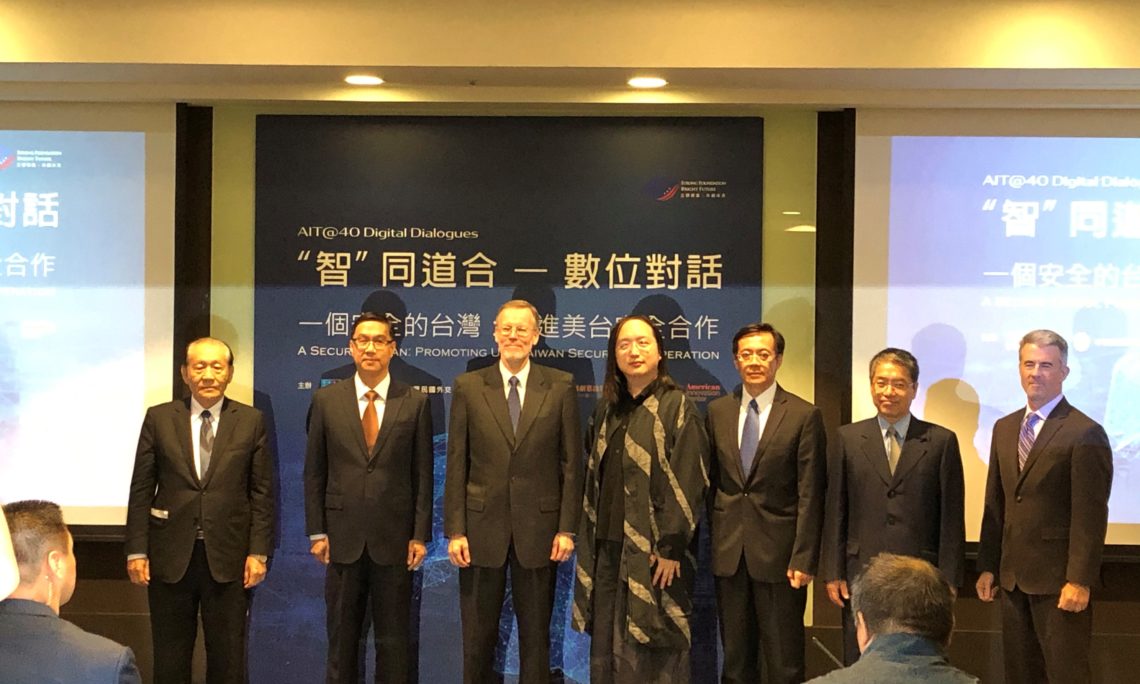OT-1986
November 7, 2019
Remarks by AIT Director W. Brent Christensen at
The Digital Dialogue Public Forum on U.S.-Taiwan Security Cooperation
November 7, 2019
(As Prepared for Delivery)
Chairman Huoh, Minister Tang, Vice Foreign Minister Tsao, distinguished panelists Professors Lai and Liu, ladies and gentlemen, wu an!
It is my great pleasure to open today’s public forum to discuss the results of our third AIT@40 Digital Dialogue. In conjunction with our AIT@40 year-long celebration, AIT has collaborated with the Taiwan authorities to organize this series of digital dialogues throughout the year to harness artificial intelligence and the wisdom of the crowd to identify areas of consensus and the most promising ideas to advance the U.S.-Taiwan relationship. In other words, as democracies, we value the opinions of our citizens. Through this digital dialogue, we engage the local community to solicit ideas on how we can work together to better achieve our common goal of a secure Taiwan.
Today’s forum focuses on a topic that has attracted a great deal of attention, not only in the United States and Taiwan, but also throughout the Indo-Pacific region and across the Strait: promoting U.S.-Taiwan security cooperation.
When I assumed my position as AIT Director, I included security cooperation as one of my “four promotes,” or 四個增進 – the top priorities for my tenure. Recall that in August – our AIT@40 Security Cooperation month – I launched this third digital dialogue by asking the general public a question: How should the United States and Taiwan deepen their security cooperation relationship against the backdrop of cross-Strait tensions, U.S.-China differences, new and emerging threats, and an increasingly complex Indo-Pacific regional security environment?
Since then, over the past two months, we have solicited the general public’s views virtually, and have welcomed the hundreds of ideas that those have shared and voted on, on how to further U.S.-Taiwan security cooperation. Thanks to the innovative digital platform tools pioneered by Digital Minister Audrey Tang, we have been able to identify the ten ideas that received the most attention. Our panel of experts will discuss each of these top ten ideas later in the program, but first I’d like to illuminate some of the key themes that have emerged from these responses.
First, the PRC poses more than a military threat to Taiwan. In addition to its increasingly provocative military activities across the Strait, Beijing has also aimed a wide range of non-traditional threats at Taiwan: a stream of disinformation aimed at undermining public faith in democracy, diplomatic pressures to squeeze Taiwan’s international space and restrict Taiwan’s participation in the international community, and economic coercion. These non-traditional threats call for non-traditional responses, and we have encouraged and supported Taiwan’s efforts to adopt innovative and asymmetric approaches to make Taiwan, and the entire region, more resistant to these threats.
Second, promoting U.S.-Taiwan security cooperation is not limited to just the United States and Taiwan. The participation of like-minded countries and democracies sends the strong message that Taiwan is not alone. A clear example of this support is our Global Cooperation and Training Framework, or GCTF. What began as a solely bilateral U.S.-Taiwan initiative in 2015 has expanded: our GCTF workshops this year have grown to include Japan as a regular partner and we seek to include more like-minded partners in future cooperation. Let me stress that support from like-minded countries does not just benefit Taiwan, it is a vital factor in upholding our vision for a free and open Indo-Pacific region.
Third, the U.S.-Taiwan relationship is not based on a common threat, but on a solemn adherence to shared values. Democracy, tolerance, freedom, pluralism, and equality under the law – these among others are the shared values that have fostered the mutual trust and open communication that have allowed our relationship to thrive. Indeed, this very forum is a testament to the fact that democracy can be a source of policy innovation. That we welcome open discussion – even dissent – to inform policy-making stands in stark contrast to alternative systems of governance that limit freedoms, contravene the rules-based international order, and discourage innovation.
In closing, I’d like reiterate my appreciation to Digital Minister Tang and Vice Minister Tsao and the MOFA team for working with AIT to co-host this digital dialogue public forum, to General Huoh for the keynote remarks, and to the panelists – Dr. Lai, Dr. Liu, and Brad – for delving deeper into the conversation.
Though we may have different ideas and priorities when it comes to security cooperation, but I am confident that through healthy discussion we will move closer to what we all desire: a more secure Taiwan.
Thank you again to all for coming today.
















![Video Thumbnail [Recovered]-01](../wp-content/uploads/sites/269/Video-Thumbnail-Recovered-01-1-750x450.jpg)






